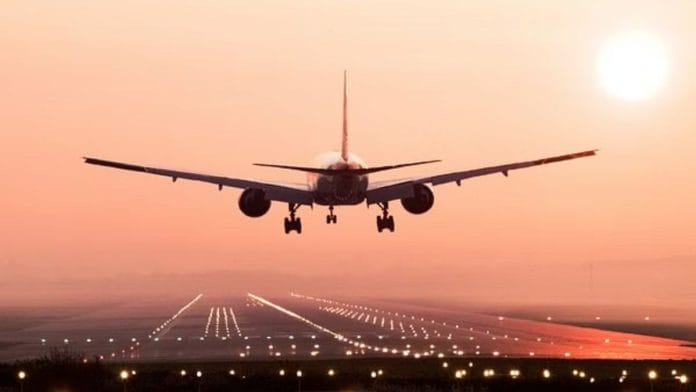New Delhi: India’s airline operators using Boeing’s 737 MAX series of aircraft have “satisfactorily” completed a safety audit of their planes, the Directorate General of Civil Aviation (DGCA) has said. However, a separate audit following a December 2023 Boeing advisory found a “missing washer” — an implement used to hold components in place — on one of the aircraft, an official of the civil aviation regulator said.
The first of the two above-mentioned inspections was ordered by the DGCA after a 5 January incident involving the US’ Alaska Airlines, where a portion of the plane’s fuselage blew off shortly after take-off. The plane subsequently made an emergency landing with all its 171 passengers and crew safe.
The incident has reportedly been attributed to a door plug — installed to replace unused exits — detaching from the jet, resulting in a door-sized hole in the wall of the main passenger cabin.
The plane involved belonged to Boeing’s 737 MAX 9 series, which is not used in India. Indian airlines use the Boeing B737 MAX 8 variant of the aircraft.
In a statement on the Alaska Airlines incident, Boeing said “safety is our top priority and we deeply regret the impact this event has had on our customers and their passengers”.
“We agree with and fully support the FAA’s (US civil aviation regulator Federal Aviation Administration’s) decision to require immediate inspections of 737-9 airplanes with the same configuration as the affected airplane,” it added, saying a Boeing technical team is supporting the investigation into the accident.
Indian operators have a fleet of 40 Boeing 737 MAX aircraft, operated by Akasa (22), SpiceJet (9) and Air India Express (9).
In a statement Monday, the DGCA said it had ordered the audit on 6 January “as a precautionary measure”, adding that all Indian operators with Boeing 737 Max 8 aircraft were directed “to check the operation and proper closing of all over wing emergency exits by 7.1.2024”.
“These checks have been satisfactorily performed on the fleet of operational… Boeing B737-8 Max aircraft by Air India Express, Spicejet and Akasa.”
The DGCA statement added that, apart from the Max 8 aircraft, Akasa Air’s fleet also includes a Boeing 737-8200 aircraft, which had also been satisfactorily checked.
SpiceJet also issued a statement to say their aircraft had passed safety audits and they didn’t operate the 737 Max 9 series.
“We have conducted a comprehensive examination of our Boeing 737 MAX fleet, as per the directives of the DGCA,” a SpiceJet spokesperson said.
“No adverse findings were identified during this inspection. Our flight operations remained unaffected and continued to operate as usual.”
An Akasa Air spokesperson said the airline had completed a thorough inspection of its entire fleet of in-service Boeing 737 Max aircraft. “We can confirm that there are no adverse findings. We can also confirm that there was no disruption to our operations during this time. Akasa Air does not have any Boeing 737 Max 9 aircraft in its fleet…” the spokesperson added.
Also Read: Sensitise pilots, cabin crew members on unauthorised cockpit entry, says DGCA
Trouble for Boeing
According to a New York Times report on the Alaska Airlines incident, federal investigators in the US have said that it is possible the bolts that were supposed to keep the door plug in place were never installed.
Alaska Airlines has said that, since the incident, it has found “some loose hardware” on a few Max 9s. Another American user of these aircraft, United Airlines, has said that bolts in need of “additional tightening” have been found during inspections of Boeing 737 Max 9s.
According to a report in Reuters, the fuselage for Boeing 737s is made by Kansas-based Spirit AeroSystems. Spirit is one of two suppliers that makes the door plugs for the MAX 9, but Boeing also has a key role in the plug installation process.
‘Missing washer’
However, the DGCA official cited above said an Indian aircraft operator had found a “missing washer” on a Boeing 737 MAX aircraft during an earlier inspection, which was carried out after a December 2023 advisory issued by US-headquartered Boeing.
The advisory asked all airlines to inspect their 737 Max jets for possible loose parts in the aircraft’s rudder-control systems.
However, a DGCA official who wished to remain anonymous said an Indian aircraft operator had found a “missing washer” on a Boeing 737 MAX aircraft during an earlier inspection.
The inspection was carried out following a December 2023 advisory by the US-headquartered Boeing. The advisory asked all airlines to inspect their 737 Max jets for possible loose parts in the aircraft’s rudder-control systems.
This advisory came after an international operator discovered a bolt with a missing nut while performing routine maintenance on a mechanism in the rudder-control linkage.
The company had discovered an additional undelivered aircraft with a nut that was not properly tightened, according to a statement by US’ Federal Aviation Administration issued in December.
“Inspections on 39 aircraft have been completed with nil findings except on one aircraft wherein a missing washer was found,” the DGCA official said. “Rectification action as per recommendations of Boeing has been taken prior to release of this aircraft. Inspection on the remaining one aircraft will be completed prior to release for service.”
(Edited by Sunanda Ranjan)
Also Read: Changes in night duty, longer weekly rest period — new DGCA rules seek to reduce pilot, crew fatigue






